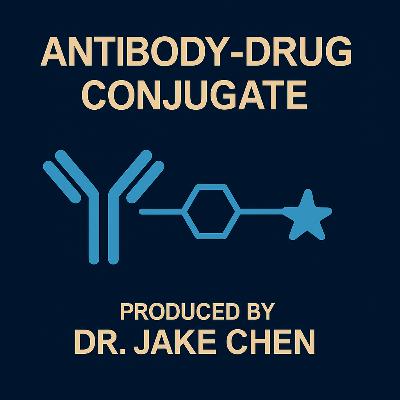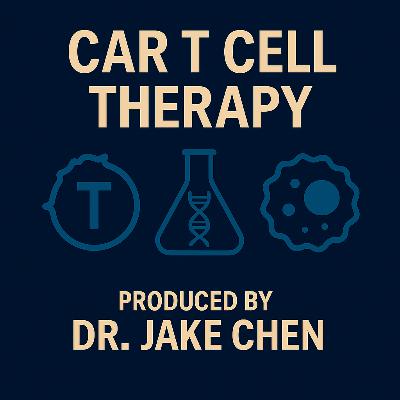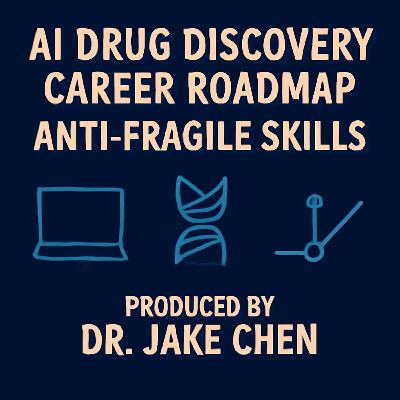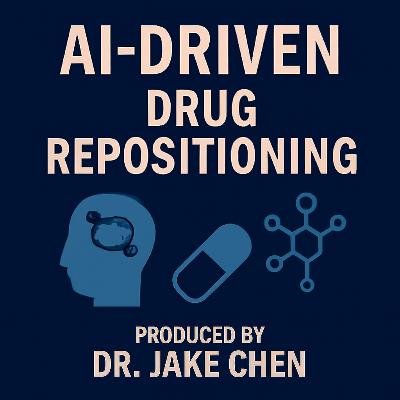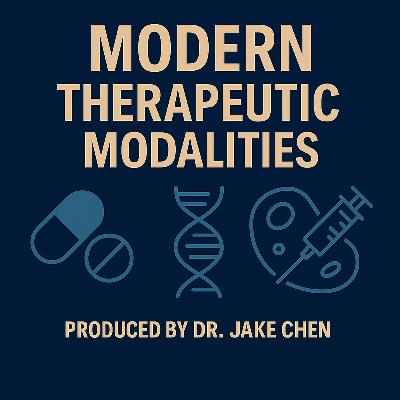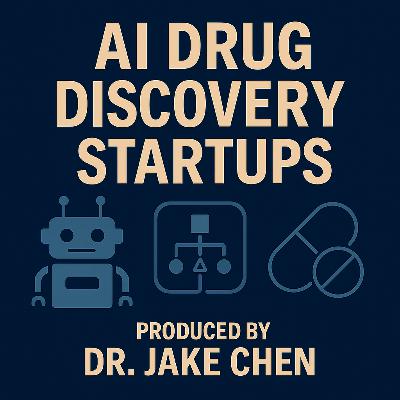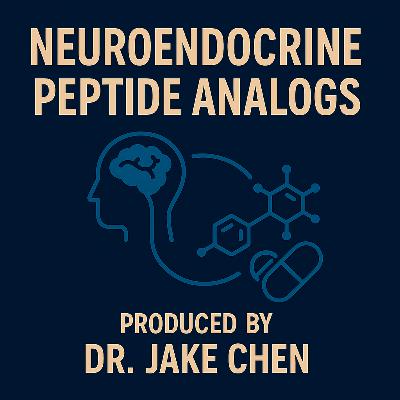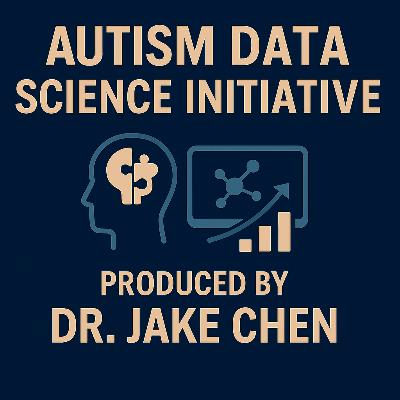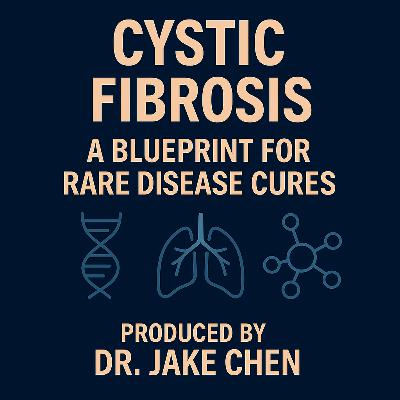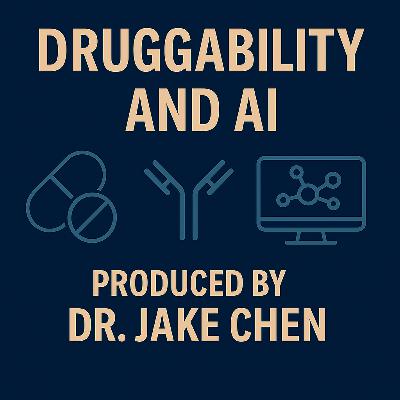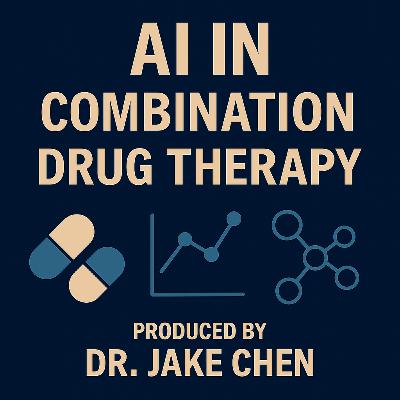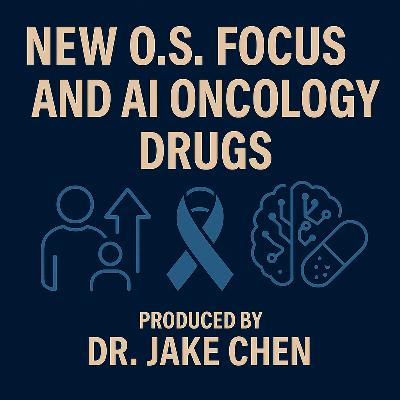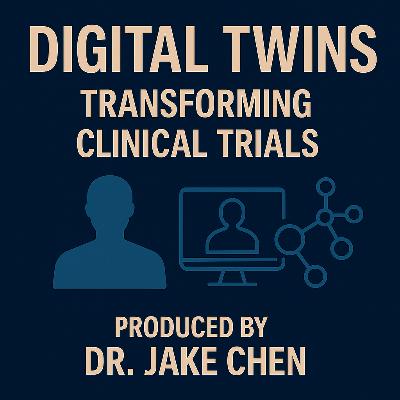Discover Drug Discovery AI Talk
Drug Discovery AI Talk

43 Episodes
Reverse
In this episode, we discuss antibody–drug conjugates (ADCs) , which harness monoclonal antibodies to deliver potent cytotoxic drugs directly to tumors, combining specificity with powerful cell‑killing effects. From Paul Ehrlich’s “magic‑bullet” concept to the first clinical trial in the 1980s and today’s 21 approved drugs, the field has evolved through advances in linker chemistry, payload potency, and antibody engineering. Modern ADCs treat diverse cancers by targeting antigens such as HER2, CD33, and TROP‑2 and by using microtubule inhibitors, DNA‑damaging agents, or topoisomerase‑I inhibitors as payloads. The podcast also touches on challenges such as drug resistance and manufacturing complexity, emerging innovations like bispecific and dual‑payload constructs, and the growing role of AI-driven design and industry partnerships in shaping the next generation of ADCs . Produced by Dr. Jake Chen.
This podcast collectively provides a comprehensive overview of immunogenicity in therapeutic protein, peptide, and antibody-based products, focusing on the formation and clinical significance of anti-drug antibodies (ADAs). They explain that immunogenicity is influenced by intrinsic patient factors (genetics like HLA haplotypes, disease state) and extrinsic product factors (formulation, aggregation, dose, and route of administration). Regulatory bodies like the FDA and EMA mandate a tiered testing strategy—including screening, confirmation, titration, and functional Neutralizing Antibody (NAb) assays, often cell-based bioassays—to detect and characterize ADAs, with a specific emphasis on overcoming drug-tolerance interference. The material also details the bioanalytical complexities of newer modalities, such as Antibody-Drug Conjugates (ADCs) and CAR-T cell therapies. It highlights that ADA formation can lead to serious consequences, including loss of efficacy (PK/PD effects) and adverse events such as Pure Red Cell Aplasia (PRCA). Finally, the texts discuss mitigation strategies, including in silico risk prediction (epitope mapping) and molecular engineering (de-immunization, PEGylation), to ensure patient safety and product effectiveness throughout the lifecycle. Produced by Dr. Jake Chen.
In this episode, we provide a comprehensive overview of Chimeric Antigen Receptor (CAR) T cell therapy, a revolutionary form of personalized immunotherapy that utilizes a patient's own genetically engineered T cells to target cancer. It traces the therapy's historical evolution from first-generation CARs (in the late 1980s) to highly potent second-generation CARs that achieved initial, durable clinical successes in blood cancers, citing landmark patients like Emily Whitehead and subsequent FDA approvals starting in 2017. Furthermore, the text details manufacturing challenges in the current autologous model versus the potential of allogeneic "off-the-shelf" CAR-T, and thoroughly explains major safety concerns, such as Cytokine Release Syndrome (CRS) and ICANS, along with established management protocols. Finally, the analysis covers emerging applications beyond oncology—specifically in autoimmune diseases like lupus—and discusses future directions involving AI, digital twins, and advanced CAR designs to improve scalability, safety, and efficacy against challenging solid tumors. Produced by Dr. Jake Chen.
The episode provides a comprehensive analysis of recent Phase III clinical trials for Alzheimer's disease (AD), concluding that successful drug development depends on mechanistic precision—targeting the appropriate pathology, such as fibrillar amyloid—at the earliest possible stages of the disorder. Failures, exemplified by drugs like solanezumab, demonstrate that therapies lacking biomarker-guided early intervention or focusing on indirect metabolic pathways often fail to slow cognitive decline in symptomatic patients. To overcome the challenges of high costs, patient heterogeneity, and signal dilution in current research, the source advocates for the immediate adoption of Artificial Intelligence (AI) tools in trial design. Key AI applications, including digital twins and advanced patient stratification models, are proposed to simulate individual disease trajectories, reduce required sample sizes, and accurately identify specific patient subgroups likely to benefit from a given treatment. Integrating these technological and methodological shifts will help accelerate the discovery of combination therapies and prevent costly pharmaceutical failures. Produced by Dr. Jake Chen.
This report outlines a career roadmap for success in AI-driven drug discovery, emphasizing the need for an anti-fragile, T-shaped skill set to thrive in the rapidly evolving pharmaceutical industry. The global job market analysis, including comparisons between the US and China, highlights a growing demand for cross-functional specialists. However, roles that focus solely on routine tasks are at increasing risk of automation. Key competencies across six major domains are identified: AI/ML/Software development, Biological/Chemical science expertise, strong Cognitive/Mathematical foundations, and practical Experimental/Data generation skills. Professionals must also have strategic Translational/Regulatory knowledge to ensure AI-driven innovations meet clinical and compliance standards. The most valuable and resilient roles rely on Leadership and Meta-Skills, such as adaptability and cross-functional communication—traits machines cannot replicate, positioning these professionals to shape the future of R&D. Produced by Dr. Jake Chen.
This episode explores the growing competition and complex interdependence between the U.S. and China in the global biotechnology and biopharma sectors. With China’s state-backed biotech ecosystem advancing rapidly, particularly through faster, cheaper clinical trials, Chinese companies are developing high-quality drug candidates that are being out-licensed to Western pharmaceutical firms. This dynamic is putting pressure on U.S. biotechs, prompting a geopolitical response exemplified by legislation such as the Biosecure Act, which aims to reduce reliance on Chinese contract manufacturing and research organizations (CROs/CDMOs) due to national security and IP concerns. Despite this tension, both countries continue to leverage each other’s strengths, as AI integration into drug development and the FDA's regulatory adaptation highlight the industry’s rapid technological transformation. Produced by Dr. Jake Chen.
In this episode, we explore Open Source Drug Discovery 2.0 (OSDD-2) pioneered by Dr. Jake Chen. OSDD-2 represents a groundbreaking framework reimagining how new medicines are developed by combining open collaboration with sustainable commercialization. Designed to counteract rising R&D costs and inefficiency, OSDD-2 integrates AI-powered discovery tools, open-access data, and a hybrid IP model to democratize innovation. The episode introduces the concept of “IP gating,” where early-stage research is conducted collaboratively and transparently. Still, it transitions to limited exclusivity once key milestones are reached—balancing openness with incentives for private investment. Through the example of a project targeting a novel target in Alzheimer’s disease, the discussion highlights how this model could de-risk early research, attract capital for late-stage development, and establish a more equitable and efficient global drug discovery ecosystem. Produced by Dr. Jake Chen.
In this podcast episode, we explore how Artificial Intelligence (AI) is reshaping the Investigational New Drug (IND) submission process across therapeutic areas. Advanced tools such as Natural Language Processing (NLP) and generative AI are being deployed to streamline regulatory documentation, automate data integration, and enhance pharmacovigilance systems. These technologies have been shown to cut submission preparation time nearly in half while improving accuracy and compliance. However, they also raise challenges around model transparency, validation, and bias mitigation. Regulatory agencies like the FDA and EMA are now developing risk-based frameworks to guide responsible AI adoption, marking the beginning of a new era where AI not only accelerates innovation but also strengthens regulatory rigor. Produced by Dr. Jake Chen.
In this podcast episode, we explore how artificial intelligence (AI) is revolutionizing drug repurposing, transforming it from a process guided by serendipity into a systematic, data-driven discipline. The discussion highlights AI and machine learning technologies—including deep learning, knowledge graphs, and natural language processing—that identify new therapeutic uses for existing drugs. Real-world case studies, such as the repurposing of Baricitinib for COVID-19, showcase these advances in action. We also contrast these modern methods with the traditional era of drug repurposing, exemplified by thalidomide’s complex legacy, to underscore both scientific progress and ethical responsibility. Finally, the episode examines ongoing challenges, including data quality, validation, and human oversight, as AI continues to reshape the future of pharmaceutical innovation. Produced by Dr. Jake Chen.
Drug discovery is traditionally a slow and costly process. This study introduces a modular, multi-agent AI framework that automates early-stage discovery—from target identification to optimized hit generation. Integrating LLM-driven literature mining, generative chemistry, and predictive modeling, the system rapidly designs drug-like molecules across multiple Alzheimer’s disease candidate targets. Results show a 3–10× acceleration and a cost reduction of up to 40%. However, data quality remains critical, as poor datasets limit predictive reliability. The work highlights the power of human-in-the-loop AI and was featured at the 2025 Open Conference of AI Agents for Science. Produced by Dr. Jake Chen.
In this episode, we explore the evolution of modern drug modalities, from traditional small molecules and biologics to cutting-edge RNA, gene, and cell therapies. We discuss landmark regulatory approvals, including CRISPR gene editing and novel cell therapies, and highlight how Artificial Intelligence (AI) is accelerating discovery, optimizing drug design, and streamlining manufacturing. The episode compares the advantages and challenges of each modality and emphasizes integrated R&D strategies to deliver next-generation treatments for chronic, oncologic, and neurological diseases. Produced by Dr. Jake Chen.
In this episode, we explore how artificial intelligence (AI) is revolutionizing drug discovery by reducing costs and accelerating timelines through deep learning, generative models, and knowledge graphs. We trace the journey from early 2010s pioneers to today’s hybrid models that integrate software and drug assets, spotlighting leading companies like Recursion, Exscientia, and Insilico Medicine. The episode examines how success is now measured by clinical trial results and unpacks the high-stakes global competition between the United States and China to dominate this field. While the initial investment surge has stabilized, major pharmaceutical firms continue to drive progress through AI-driven partnerships, shaping the future of healthcare innovation. Produced by Dr. Jake Chen.
In this episode, we explore the critical role of neuroendocrine peptides like insulin, oxytocin, and GLP-1 in modern drug discovery. These natural molecules are powerful regulators of human physiology but have historically posed challenges due to rapid degradation and poor oral bioavailability. The discussion highlights success stories such as long-acting insulin, once-weekly semaglutide, and stable somatostatin analogs, which overcame these hurdles through rational drug design. We also delve into how innovative delivery platforms and artificial intelligence are now accelerating the discovery and optimization of next-generation peptide therapeutics, unlocking treatments for complex conditions like neurological disorders and chronic pain. Produced by Dr. Jake Chen.
This podcast episode explores the Autism Data Science Initiative (ADSI), a $50 million program launched by the U.S. National Institutes of Health in 2025, aimed at revolutionizing autism research through the use of big data and artificial intelligence (AI). The initiative aims to integrate genomic, environmental, and clinical datasets to uncover the complex causes of autism and guide more effective, individualized treatments. By leveraging machine learning and advanced analytics, ADSI seeks to identify genetic-environmental interactions, explain the rise in autism prevalence, and match interventions to the unique needs of different patient subgroups. Ultimately, the goal is to move toward precision medicine, accelerating the development of targeted therapies for core symptoms and related conditions. Produced by Dr. Jake Chen.
In this podcast episode, we explore how cystic fibrosis (CF) evolved from a fatal childhood illness to a manageable chronic condition, thanks to groundbreaking therapies targeting its molecular roots. Highlighting the development of CFTR modulator drugs like Trikafta, we discuss decades of multidisciplinary collaboration, innovative funding models, and cutting-edge technologies that made this possible. The episode also celebrates the 2025 Lasker~DeBakey Clinical Medical Research Award, honoring Michael J. Welsh, Jesús González, and Paul A. Negulescu for their pivotal roles in discovering and developing these transformative treatments. Finally, we reflect on how these achievements serve as a blueprint for advancing cures for other rare diseases, with AI poised to play a key role in the next era of discovery. Produced by Dr. Jake Chen.
This prodcast discuss the current state and future potential of AI in pharmaceutical research and development (R&D), particularly in addressing the "Eroom's Law" phenomenon, where drug development costs exponentially increase over time. While AI is showing promising results in accelerating early discovery phases—such as identifying targets and designing molecules more quickly with fewer compounds synthesized—these program-level efficiencies have not yet translated into a significant reduction in overall R&D costs or clinical trial timelines across the industry. The sources highlight that no AI-discovered drug has yet received regulatory approval, and structural bottlenecks, including fragmented data, complex late-stage trials, regulatory inertia, and organizational challenges, are hindering AI's full impact. Despite substantial investments and a rise in AI-driven partnerships, the overall productivity of drug development remains largely stagnant or worsening, with the cost per new drug continuing to be exceptionally high, prompting a call for foundational shifts in data infrastructure, trial design, regulatory frameworks, and organizational culture to leverage AI's transformative power. Produced by Dr. Jake Chen.
In this podcast, we explore the evolving concept of "druggability" in the modern era of drug discovery, emphasizing how artificial intelligence (AI) and diverse therapeutic modalities are expanding the range of treatable biological targets. It details various drug types, including traditional small molecules, biologics (like monoclonal antibodies), RNA-based therapeutics, targeted protein degraders (PROTACs and molecular glues), and conjugates (ADCs, AOCs, RDCs), outlining their mechanisms, strengths, and limitations. The document also highlights AI's transformative role in target identification, structure prediction, lead design, and tractability assessment, citing case studies in chronic diseases like cancer and neurodegeneration to illustrate the impact of these advancements. Finally, it offers strategic recommendations for integrating AI and modality-aware approaches into drug development pipelines to address previously "undruggable" diseases. Produced by Dr. Jake Chen.
This podcast offers a comprehensive overview of combination drug therapy, a strategy crucial for treating complex diseases by simultaneously targeting multiple pathways. It examines the current landscape across various therapeutic domains, noting the established use in infectious diseases, rapid expansion in oncology, nascent efforts in neurodegenerative disorders, and cautious application in immunology. We examine whether the discovery of new therapeutic combinations is accelerating, highlighting a significant surge in oncology, particularly with immunotherapy combinations. A critical discussion is presented on synergy versus additivity, revealing that most successful combinations primarily achieve their benefits through additive or independent drug actions rather than profound synergistic effects. Furthermore, the source highlights significant challenges related to increased toxicity and substantial costs associated with combination regimens, which often exceed traditional cost-effectiveness thresholds. Finally, it explores regulatory and ethical considerations, highlighting FDA guidance for co-development and IND exemptions, and details how Artificial Intelligence (AI) and machine learning are poised to revolutionize combination therapy design, from predicting synergistic pairs and aiding patient stratification to identifying low cross-resistance partners, while acknowledging current data and validation bottlenecks in translating AI predictions to clinical practice. Produced by Dr. Jake Chen.
In this podcast episode, we explore how the FDA’s new emphasis on overall survival (OS) as the gold standard for oncology drug approvals is reshaping cancer research and development. This shift raises the evidentiary bar for demonstrating true clinical benefit, requiring more rigorous and longer trials, but also creating opportunities for AI to transform the process. From preclinical drug design to survival outcome modeling, AI enables better candidate selection, deeper biological insights, and virtual trial simulations that predict long-term patient outcomes. By integrating safety, efficacy, and survival projections, AI-native drug discovery programs can deliver therapies that not only shrink tumors but also extend lives. Produced by Dr. Jake Chen.
In this episode, we provide a comprehensive overview of digital twin technology in clinical trial design, highlighting its growing adoption for creating virtual patient populations to enhance and potentially replace traditional control groups. We describe the market's rapid expansion and the technological advancements driving this growth, such as physics-informed machine learning and quantitative systems pharmacology. We also discuss the evolving regulatory landscape, with the European Medicines Agency (EMA) leading in formal qualification of these methods, while acknowledging significant technical challenges like data quality and integration, computational complexity, and model validation. Finally, we address crucial ethical considerations surrounding informed consent and placebo use, alongside the barriers to widespread adoption and future opportunities for this transformative technology. Produced by Dr. Jake Chen.


